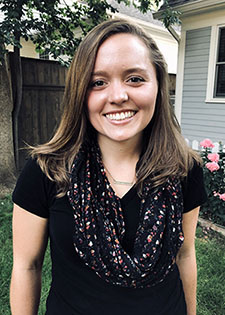Kate O’Dell accepted to aerosol school in Brazil, AMS Summer Policy Colloquium
Kate O’Dell has a busy summer ahead of her. She has been accepted to and awarded funding for an aerosol program in Brazil and also the American Meteorological Society’s Summer Policy Colloquium.
The Sao Paulo School of Advanced Science on Atmospheric Aerosols will take place July 22 through Aug. 2 at the University of Sao Paulo. The school’s main objective is to promote the gathering of atmospheric aerosol researchers with the best young researchers from around the world. The program is highly competitive, with 100 participants accepted out of 500 applications received from 67 countries. SPSAS scholars will acquire state-of-the-art scientific knowledge through theoretical classes, practical experimental activities, poster sessions and visits to research institutions.
O’Dell applied to the aerosol school for the opportunity to learn about a broad range of atmospheric aerosol-related topics from international colleges and leading experts in the field.
“I’m excited about this in-depth learning opportunity, and especially excited to gain hands-on experience with several aerosol measurement technologies through field trips and measurement projects in Sao Paulo,” O’Dell said.
O’Dell’s air quality research led her to apply for the AMS Summer Policy Colloquium, to be held June 2-11 in Washington, D.C. The colloquium is a 10-day immersion in the policy process and timely weather and climate-related topics. Graduate students will have the opportunity to meet policy makers and decision makers from Capitol Hill, federal agencies, academia, non-governmental organizations and the private sector.
O’Dell said air quality in the U.S. has significantly improved thanks to effective policy, but there’s more work to do.
“A great way to continue improving our air quality is by maintaining a strong connection between scientists and policy makers,” she said. “At the colloquium, I hope to do my part by learning more about how the policy process works and by connecting with the people who make those legislative/regulatory decisions.”



